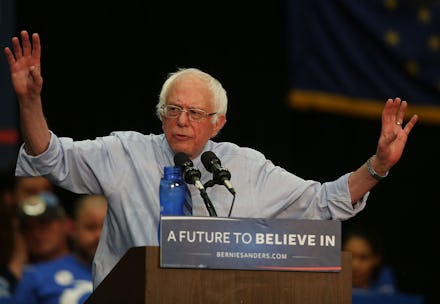Bernie Sanders Is Calling for a Contested Democratic Convention

Bernie Sanders' campaign for the Democratic presidential nomination has been making substantial cutbacks, but Sanders said Sunday at a press conference he didn't expect his rival Hillary Clinton to win a majority of pledged delegates, and that current voting trends would result in a contested party convention in July.
"It is virtually impossible for Secretary Clinton to reach the majority of convention delegates by June 14, that is the last day that a primary will be held, with pledged delegates alone — she will need superdelegates to take her over the top at the convention in Philadelphia," Sanders told reporters Sunday, according to the Huffington Post. "In other words, the convention will be a contested contest."
Read more: Bernie Sanders Begins Mass Layoffs of Campaign Staffers
Sanders said his chances of winning enough pledged delegates to secure a majority before the convention were not high, but he homed in on superdelegates — party insiders who are free to back the nominee they personally prefer — as the most prominent threat to his nomination odds.
"If I win a state with 70% of the votes, you know what? I think I'm entitled to those superdelegates," he said, according to the Huffington Post. "I think the superdelegates should reflect what the people in the state want."
Unfortunately for Sanders, superdelegates exist precisely for the purpose of tempering popular will. The superdelegate system, which gives disproportionate influence to party officials and elected members of the party like members of Congress, is deliberately designed to ensure party interests are balanced with the sentiments of rank and file who vote during the nominating contests. The logic is that the party has a right and an interest in nudging nominating contests in favor of the candidate they think will serve the party best.
Historically, superdelegates haven't significantly changed the outcome of presidential elections, but in the case of a more tightly contested nomination race like this year's, their overwhelming backing of the establishment candidate is entirely in line with why they were created. Sanders has spent his entire career in national politics standing outside the Democratic Party and criticizing it — his plea for its foremost proponents to back him is not going to be convincing.
h/t Huffington Post